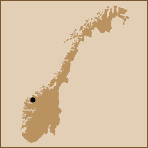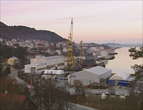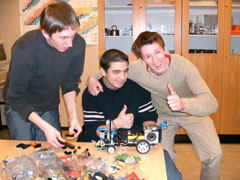HARAM VIDAREGÅANDE SKULE
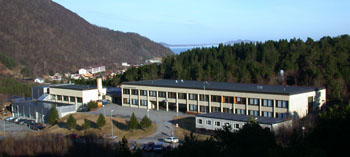 Haram upper secondary school. |
A description of the context in which we are operating
Haram vidaregåande skule is situated in Brattvåg, the centre in the municipality of Haram, and is the only upper secondary school in this area. It’s located in the north-west of Norway, 40 km from Ålesund and 60 km from Molde (on the coast between these two towns).
Brattvåg - the centre in the municipality of Haram. |
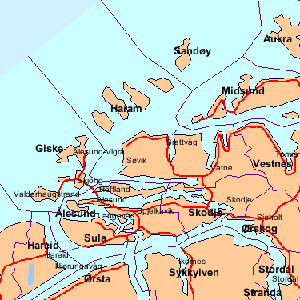 |
Our school
The school was established in 1975, and is (from 1981 on) a combined school with about 210 students and 36 teachers. It offers education in the following lines of study: mechanics, electronics, healthcare, general knowledge subjects (of sixth form) and a four-year course combining ”sixth-form” classes with the qualifications for a craft certificate within the technical sector. In addition, the school has a resource centre, where adult students take part in shorter or longer courses every year, often in connection with demands for new certifications in trade and industry. The schoool lies in an area which has been in close contact with the outside world through its fisheries, merchant fleet and industry. Since the 1940’s industries with an international market have been established. Today we have a strong maritime industry which is an integrated part of an industrial cluster in this region of Norway. In our community we have two shipsyards and several manufactures of maritime equipment. Most of these enterprises are owned by big international companies such as Rolls-Royce and Aker RGI.
The school has over the last years focused on:
We strongly believe that learning effect increases through active participation in the process of learning. We have therefore focused closely on using methodes which promote active learning, e.g. Storyline, PBL, case studies, Robolab, projects based on cooperation between different subjects, Young Enterprise and cooperative learning. The aim is to establish a closer link between the methods we use and examination form, making sure there is a close link between process and end-product.
From Project RoboLab 2004
|
In Norway, 20 years ago, 5 upper secondary schools started with new ICT-education. One of them was Haram vidaregåande skule. Since then ICT has been a natural tool for the teachers. They have been coursed in new software when necessary. A key question that was more focused during and after PILOT (Project, Innovation, Learning, Organizing and Technology) (1999-2003), was how too use ICT as a pedagogic tool in all subjects. In our teaching we aim to use ICT extensively and in a relevant way where the students use ICT for collecting and giving information, for communication, production and presentation.
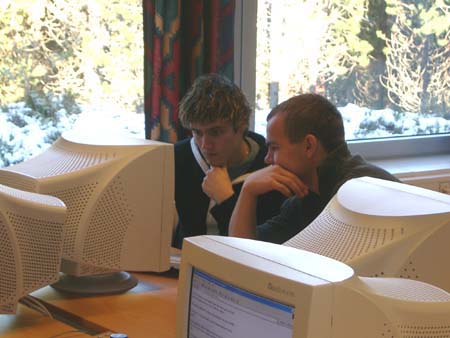
Haram vidaregåande skule is an innovative school, a relevant school for the present aiming to give something valuable for the future. Local companies are an arena for the students’ learning through a variety of methods using new technology as a tool to acquire knowledge and skills. Cooperation with industry goes back to the 1980’s with education in technical subjects and extended later through our new line of study where we combine technical and general subjects (TAF) from 1998. In this 4-year long study the students work 2-3 days per week in a local factory. Local companies are also useful partners when planning a curriculum. Through cooperation with them and contacts with schools abroad, our students will learn to be part of the international community.
Experience of participation in international cooperative activitiesIt is an overall goal in Norwegian education to give young people a high degree of international competence so that they can function well in international environment. The school is a crucial learning arena in this process, with international themes included in the education, e.g. in connection with “Operation A Day’s Work” and International Week.
Traditionally our students in our line of study for general subjects (sixth forms) have been on an excursion abroad during their third year, e.g. to Great Britain, the Czech Republic, Germany or Iceland. The reason behind this is a wish to fulfil general goals for our education and giving our students specific knowledge about the country they visit, e.g. culture, history, language, trade and industry etc.
Every year pupils from our school who take mathematics and physics as elective subjects get the opportunity to go on a motivation course for studies in engineering. Five companies in the region are responsible for the costs and “The Smallpiece Trust” with its headquarter in Birmingham, England, is reponsible for the course. The course is split into two – 1 week in Norway in autumn and 1 ½ week in England in spring.
Norwegian recruitment course part 2 - Stratford, England, February 2004 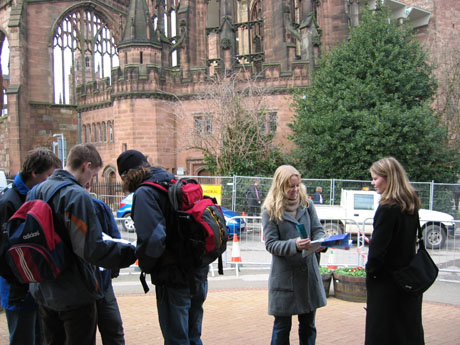 A visit to Coventry |
||
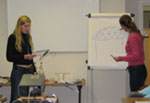 |
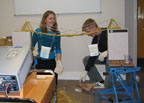 |
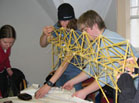 |
The Spaghetty-bridge project |
||
In November 2002 five students and a teacher from Haram vidaregåande skule were representatives for Norway at the EYP in Turin, Italy. These students were members of different committees, there each committe had specific tasks during the session of the EYP. Later the group have been an invaluable resource in our work to develop an extended and international learning arena.
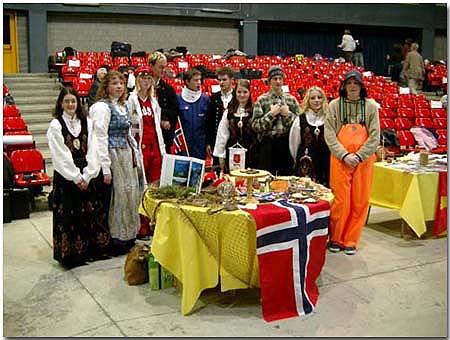 Presentation of Norway in EYP, Turin |
Why we want to participate in international cooperation projects such as Comenius 1
Participation in international cooperation projects is a means to achieve national, regional an local goals in our education. It will further the school’s international competence so that we can meet new challenges in a satisfactory way. We see that the movement toward increased internationalisation is gathering momentum and that local producers will have to sell their products on the international market. As a result, we will see a change from an industrial society to a society based on knowledge and competence. To meet this challenge new products and production methods are needed. This means more emphasis on marketing, sale, developing new products, purchasing and logistics. To achieve this focus will have to be on competence within these areas and on language skills, culture, communication and technology. The need for new skills will affect the local labour force and us as a local education institution.
- Our challenge is to give future employees a basic competence in acting on an international arena.
To achieve this we must on a larger scale use learning arenas outside school and arenas abroad. If the school wants to be an active participant in the field of education, we have to manage to act in an international context, where we communicate, cooperate and act together with foreigners in the field of education, and at the same time evaluate the quality and the outcome of this cooperation.
To meet the needs of the local trade and industry and the needs of our youth, in cooperation with trade and industry and Haram municipality we have been able to offer a new study, International Business Development (IBD) within the line for general studies. Part of the training takes place at the local business enterprises. In certain subjects this training is carried out by internal or external instructors. These students go on a relevant excursion abroad in their third year.
Innovation studio
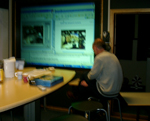 To improve the quality of the education, an innovation studio is being established. We hope this studio will coordinate the cooperation between business and school and promote and develop ideas and thoughts. The studio will be a centre for innovation and product development. The studio will have at its disposal ICT and videoconference equipment, a Design Studio. When this studio is functional and operative, we will have a new arena for proactive learning.
To improve the quality of the education, an innovation studio is being established. We hope this studio will coordinate the cooperation between business and school and promote and develop ideas and thoughts. The studio will be a centre for innovation and product development. The studio will have at its disposal ICT and videoconference equipment, a Design Studio. When this studio is functional and operative, we will have a new arena for proactive learning.
· Offer education that gives knowledge about and contact with the outside world
· Give the students an international and global perspective
· Establishing International Business Development (IBD)
· Establishing and making the innovation studio functional
· Using internationally oriented businesses as learning arenas for our pupils
· Establishing cooperation with schools outside Norway
In the longer term we will try to establish cooperation on a more permanent basis with businesses and educational institutions within the EU to be able to offer some of our students preparatory studies for Colleges and Universities abroad.
Those who are involved in defining the objectives and priorities, and are setting our policies in this area.
The internationalisation goals are based on national legislation and on local plans. These have been discussed in different governing bodies such as the education board and the school board. They have been discussed with different groups within the school (students and employees), with local trade and industries and the municipal authorities. Within this framework, the school is free to operate in order to achieve its goals, evaluate measures that have been taken and set new goals for the internationalisation.
